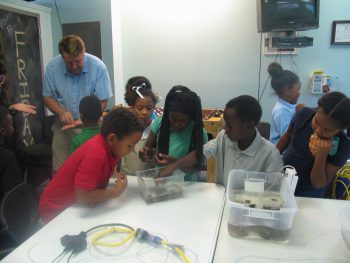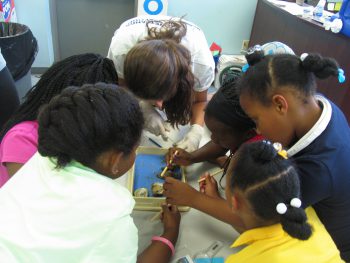
Educator Ted Wilgis, left, leads students in a touch tank activity at BRC’s community center.
The North Carolina Coastal Federation’s southeast office in Wrightsville Beach has been expanding its community outreach by beginning a partnership with the Blue Ribbon Commission on the Prevention of Youth Violence (BRC).
One of the federation’s priorities is to reach underserved communities through education and outreach programs. Ted Wilgis, the southeast region’s coastal education coordinator, and Nina Quaratella, the southeast region’s AmeriCorps member, have recently established a partnership with the BRC. This is a 501(c)(3) non-profit located in the north side of downtown Wilmington, which is designated as the “Youth Enrichment Zone.” In response to high levels of youth violence, this organization focuses on positive youth development through after-school programs, job skills programs and access to wellness services for community members in the zone.
Wilgis and Quaratella worked with staff at the organization to develop a draft schedule of interconnected programs that help students learn more about their local environment and promote environmental stewardship in the coastal region.
At the first program, federation staff and interns brought live marine animals to the BRC’s community center. Among the animals brought for the program were sea urchins, blue crabs, sea spiders and juvenile fish. Students were given the opportunity to touch the animals, learn about their habitats and discuss ways to keep coastal habitats healthy. The program, similar to the popular “Touch Tank Tuesday” summer program, was a new experience for many of the students.
During the federation’s most recent visit, students were given the opportunity to learn about the Eastern oyster through hands-on activities. Oysters are a vital species to the coast because they clean water through filter feeding, provide habitat and serve as a food source for humans and marine life. The students got their hands dirty as they poked around the inside of an oyster with dissecting tools and learned about its internal anatomy. This lesson concluded with a fun oyster craft for the students to take home.
After just two visits, the students have gained a breadth of knowledge on marine sciences and environmental stewardship along with valuable experiences. Taylor Diggs, the after-school program coordinator at the BRC, said that students are excited and eager to learn about coastal environments.

Americorps member Nina Quaratella, center, assists students with an oyster dissection.
“More often than not, many people do not have the opportunity to learn and explore different aspects of the coast. For our kids to be able to get up close and personal with such amazing organisms and learn very important information about the environment is a blessing,” Diggs said. “Our kids get so excited every time they learn you guys are coming! Seeing them really dive into the material and the willingness expressed to learn shows just how important the North Carolina Coastal Federation is.”
The federation has three more programs scheduled with the BRC in the next few months and will look to schedule future programs for 2017. These program topics will transition from coastal habitats and marine animals to stormwater runoff in the fall. To tie all of the topics together, the students will wrap up with a trip to a nearby water source and take water quality measurements with an accompanying lesson on how water quality impacts the coastal environment.
“The students are so great to work with. They are excited to learn and are very receptive in our activities,” Quaratella said. “I am really excited to continue to work alongside them and everyone at the BRC.”
The federation offers free environmental education programs for grades K-12 in the Cape Fear region. For more information on how to organize an education program, please contact Ted Wilgis (tedw@nccoast.org, 910-509-2838 ext. 202) or Nina Quaratella (ninaq@nccoast.org, 910-509-2838 ext. 200).
